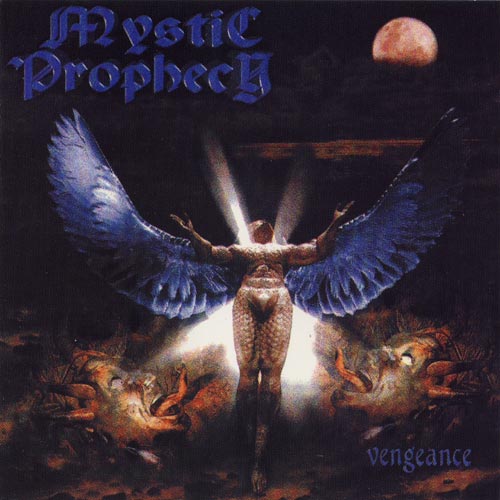A fresh approach to contemporary Euro power - 91%
During the last years of the 90’s, European power metal had reached a point where it was generally frowned upon. This basically happened because the bands that focused on that particular metal genre fell into two broad categories. On the one hand, there were some groups that were so faithful disciples of Heloween, that they copied even the worst elements of this band. Hence, their compositions were based on light guitar riffs and refrains, where all group members sang together, pretty much like a happy family. The term “happy Euro power” was soon invented to describe this approach. In the best cases, these bands sounded simply unimportant and repetitive; in the worst cases, they sounded childish and ridiculous. On the other hand, a large number of other bands decided that they should return back to their roots, and concentrated on developing a sound similar to that of the classic groups of the 80’s . These groups showed no intention or interest of composing extremely sophisticated songs, and claimed that their music should be called “true metal”, as it was a manifestation of inner, mutual and true feelings through heavy metal. Although the “true metal” movement did occasionally produce some interesting moments, it usually left the taste of old and tasteless wine placed into new bottles.
It was obvious that European power metal was in need of a new approach, a new direction. This new approach should attempt to avoid contemporary power’s flaws, that is, it should try, if possible, not to sound like “happy Euro power”. In addition, if it focused on influences from older metal schools, it should try to stay clear of obsoleteness and provide something more than a simple repetition.
Of course, the introduction of this new direction called for the recruitment of experienced and potent musicians. Formed in 2000, Mystic Prophecy easily earns the title of an “all - star” band. Their first line up included bassist Mark Albrecht, who had been a member of cult 80’s heroes Stormwitch, wonder - kid guitarist Gus G., who has since then appeared in a multitude of groups, always displaying excellent abilities, and vocalist Roberto Dimitri Liapakis, who soon became famous for his somehow operatic style of singing and his remarkably strong lungs. The quartet was completed with the addition of drummer Dennis Ekdahl.
“Vengeance”, Mystic Prophecy’s first album, is, in a nutshell, a very good and rather original record. Following a short narrative introduction, the first notes of “Sky’s Burning” reveal that something totally different than “happy Euro power” is at store here. The title of this track pretty much says it all: Mystic Prophecy’s music sounds so aggressive and savage, that one is led to believe that its ultimate ambition is to set the sky afire. Even though most structures aren’t very complicated and usually follow a pattern of five or six chords and notes, the guitars are always heavy and solid as lead. Mystic Prophecy seem reluctant to conceal their thrash influences, and they also seem proud of this fact (“Welcome In The Dark Circle”). However, the band sees to it that their aggressive and savage sounding compositions don’t lose in catchiness and beauty: most tracks reach their peaks in excellent refrains, which, once heard, are difficult to forget. “Dark Side Of The Moon”, “When Shadows Fall” and “River Of Hate” are all good examples of this rule. Even when exploring more melodic paths, Mystic Prophecy provide us with memorable results (“In The Mirror”). The lead breaks are probably the only element in the guitar work of “Vengeance” that is not so impressive. When relying on his lead guitar, Gus G. sticks to his European power metal heritage, and this makes his solos sound too light or “happy” at times. Moreover, the “watch me play as fast and pointlessly as possible” syndrome also makes its appearance every now and then.
However, “Vengeance” sounds refreshing and innovative not just because of its heaviness and “cruelty”, but also because of Liapakis’ magnificent vocal performance. Generally speaking, two stereotypes have been attributed to European power metal singers. The first of these stereotypes dictates that vocalists should be able to reach extremely high notes. If they end up sounding like ambulance sirens, so much the better. The second stereotype demands that the entire band should be quick to support the lead vocalist with backing vocals, especially when it comes to refrains. In “Vengeance”, Liapakis’ approach to singing proves both these stereotypes to be wrong. The lead vocalist of Mystic Prophecy develops a deeper sound than most power metal singers employ. Furthermore, even though he displays the ability to sound like a siren from time to time, he generally prefers to use notes that are low and long in duration, notes that convey a very passionate, very emotional feeling. As stated earlier, this provides his vocal style with an operatic, unique touch. As far as the second stereotype is concerned, the brilliant way that Liapkakis’ voice embraces the different chords makes the already heavy riffs sound even heavier. Although Mystic Prophecy do sometimes employ backing vocals, Liapakis possesses a voice that is powerful beyond belief, and thus, he does not need to be supported in each and every single occasion.
In conclusion, it is obvious that European power metal runs the risk of either becoming obsolete, or drowning in its own melody. In this light, it most certainly needs to adopt new and fresh approaches. Mystic Prophecy’s attempt to introduce more heavy elements to the classic power sound clearly opens a way out of the dead end, a way that other bands should be encouraged to follow.

